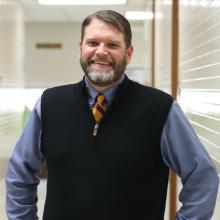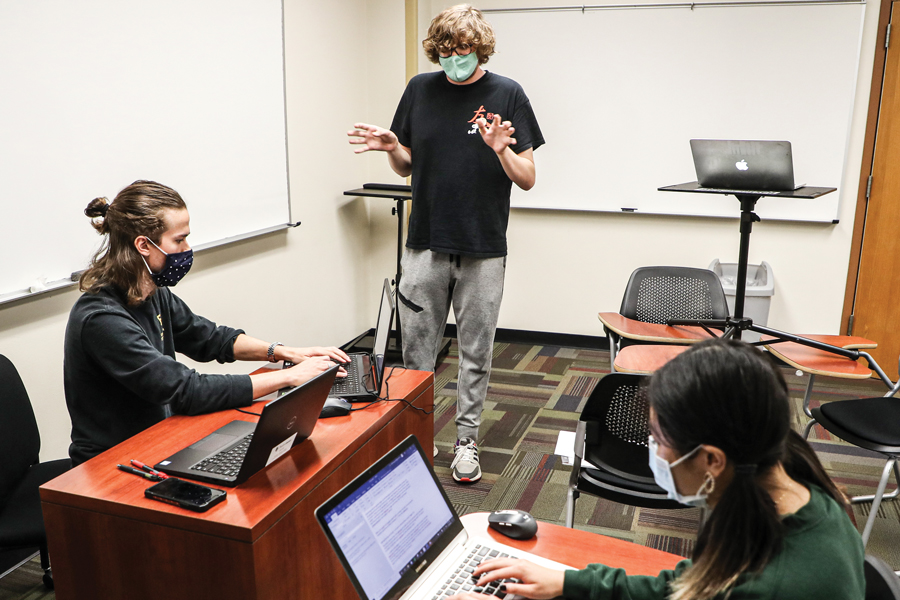Seeing Both Sides
For more than a century, Baylor debaters have successfully examined the important issues facing society
During Ciarra McClinton’s senior year at Guyer High School in Denton, Texas, Baylor University recruited the accomplished young debater and offered her a scholarship to come to Waco. And while her freshman year as a Baylor debater was different than what she imagined (with the COVID-19 pandemic), she still managed to win her first college competition. McClinton’s win was another in a long line of victories that have maintained Baylor’s excellence in debate for more than a century.
Baylor’s first intercollegiate debate took place in 1893 against the University of Texas, which means that Baylor has been facing other universities in debate for longer than it has in football or any other sport. Since that first contest, Baylor has won the National Debate Tournament three times and has placed teams in the Final Four of the national tournament nine times.
“While we don’t win the national championship every year, we put our debaters in position to compete for that goal every year. We are up there in the top echelon. We’re perennially a nationally competitive program.”Dr. Matt Gerber, Director of Debate
A Prestigious Program
Southeastern State College — now Southeastern Oklahoma State University — won the first National Debate Tournament in 1947, and it’s where Dr. Matt Gerber earned his undergraduate degree. Gerber, a three-time national tournament qualifier in college, is the Glenn R. Capp Endowed Chair of Forensics and director of debate at Baylor, where he’s been teaching and coaching since 2003. He also has a master’s degree from Baylor and a PhD from the University of Kansas.
“Kansas has a dominant debate program,” Gerber said. “Kansas debate is kind of like Alabama football. The PhD program there is like a debate coach factory.”
Gerber said Kansas is obviously among the top debate programs in the country, along with Harvard, Northwestern, Wake Forest and a few others.
“And then I would put Baylor in that category,” he said. “While we don’t win the national championship every year, we put our debaters in position to compete for that goal every year. We are up there in the top echelon. We’re perennially a nationally competitive program.”
Top-level Recruits
The good reputation of the Baylor debate program draws some of the top high school debate students in the nation — such as Anthony Wyatt, a junior from Lindale, Texas.
“Debate is a prestigious sort of community,” Wyatt said. “It’s something you don’t really get in the classroom. You get put in a lot of real-world experiences that you don’t get to engage in during a lecture.”
Those real-world experiences often lead some debate students after graduation to law school, while others pursue careers in the public sector, working at think tanks and for lobbying groups and advocacy and public policy organizations, Gerber said.
“They want folks with world-class research skills and expertise in policy,” he said, “and debate teaches lightning-fast critical thinking skills as well.”
Elan Wilson, a senior on the Baylor debate team, is headed to law school after graduation. He said what he’s learned during his time in debate will translate well into his career plans and beyond.
“One skill that debate has equipped me with is interpretation,” Wilson said, “just weighing competing perspectives and opposing sides. There’s a really good clash of ideas, and at the end of the day, the opponents either come to a compromise or intensify the disagreement. That sort of skill will translate well not only to a law career but to just being a human because you’re going to have to come into contact with people that you disagree with and who have opposing perspectives. You have to know how to have humane and rich conversations with those people because you can’t just get rid of them. You have to engage with them in some way.”
Well-rounded Approach
Baylor takes part in intercollegiate policy debate, where a team of two partners competes against a two-person team from another university. The topic of the debate is voted on in late July and remains the same nationally throughout the competition season. Recent topics have centered around healthcare reform, executive power, climate change and American space policy. This year, the topic focuses on U.S. military alliances.
“It’s about whether or not the United States should reduce its alliance commitments to Korea, Japan, the Philippines and NATO member states,” McClinton said. “Those are the topic countries this year.”
All college debate teams must thoroughly research this topic from every perspective before competing, so that during a tournament, they will be equally prepared to argue both sides of the issue. In some rounds, a team will be assigned the affirmative side — putting forth arguments and proposing a plan to support the topic proposition. In other rounds, the same team will be assigned the negative side — arguing against the topic proposition and trying to put holes in the affirmative’s plan.
“You go into the room and you’re locked into a side,” Wilson said. “So, if in round one, I’m affirmative, I’ll go in and read my affirmative arguments. And then in round two, I’ll go in and read my negative arguments.”
Teams must approach the assigned issue “from a plethora of different angles,” Wilson said.
“You might sit down and be like, ‘Okay, let’s approach this topic from more of a philosophical and abstract perspective, and let’s tie in a bunch of authors and theorists who could present those arguments in a persuasive way.’ And then in another regard, you could be like, ‘Okay, let’s just view this topic through a pragmatic public policy viewpoint. And then let’s accumulate evidence to support that position.’”
Even though each team is arguing different sides of an issue, their stances aren’t always clear-cut. In one of Gerber’s favorite debates when he was a college student, the topic called for changes to criminal procedures.
“What I liked about the topic was that it was bidirectional,” he said. “It didn’t require increased mandatory sentencing, and it didn’t require decreased sentencing. It simply called for change. So, on the affirmative, you could either be tough on crime or soft on crime, or you could walk the middle line and wait for your opponents to take a position.”
COVID-19 Changes
With the onset of the COVID-19 pandemic, college debaters across the country have been forced to temporarily give up in-person tournaments and compete using virtual means. Baylor debaters have adjusted well to this new means of competition. In Baylor’s first-ever virtual competition — a tournament hosted on Zoom by Binghamton University in Binghamton, New York, in September 2020 — the Baylor team of freshman Ciarra McClinton and junior Jonas Thrasher-Evers was declared tournament champions after nine total rounds of debate.
“That was the first virtual college debate tournament that members of Baylor’s Glenn R. Capp Debate Forum have ever competed in,” Gerber said. “During the 2020-2021 academic year, most college debate competitions are being conducted on a modified version of the Zoom platform, which is quite different from the typical, in-person debate format. This season, rather than traveling across the country to gather and compete against our opponents face to face, our teams are hunkering down in the Castellaw building’s classrooms for a series of online, socially distanced debates.”
Valuable Career Skills
The lessons debaters learn at Baylor will go with them after they graduate and leave campus. The ability that debaters develop to recognize and research all sides of an issue has proven to be an asset in former Baylor debater Kendall Kaut’s current position as assistant district attorney for Johnson County in Overland Park, Kansas.
“Oftentimes in a legal issue, I can’t find the case I need at first,” Kaut said. “Or I can’t find the thing that will help me out the most. And then I’m able to process, ‘Okay, if I was really thinking about a key word or phrase, how would I find that?’ It’s the same skills you need to debate, whether it’s about nuclear weapons policy or immigration. It can transfer to a new field like the law.”
Kaut was a four-year member of the Baylor debate team and president of the squad his senior year. He achieved a Top-25 national ranking for three seasons before graduating in 2013. He majored in political science and government at Baylor, then earned his law degree from Kansas.
Kaut received a full-tuition debate scholarship during his four years at Baylor. But for Katlin Nguyen, a junior communication major, that financial assistance didn’t materialize until her sophomore year. During her freshman year, she took part in debate without a scholarship as a walk-on member of the team.
“I came from a really small high school, and I didn’t think my preparation was adequate enough to debate for Baylor,” she said. “A lot of the people who join a college debate team have been debating for more than four years. Maybe they started in middle school, or they’ve won a lot of competitions in high school.”
After Nguyen’s first year at Baylor, she won a scholarship. “I think Dr. Gerber saw the passion that I had for debate and realized that this is something that I want to continue to do,” she said.
Like most debate team members, Nguyen is a communication major, but she is also studying for a medical career.
“One skill that I’ve built up in debate is critical thinking. That will be beneficial in my future career, when pressure occurs and I have to think quickly. That’s something that I will be trained in,” she said.
For a longer look at the history of Baylor debate, please see “Our Back Pages.”

